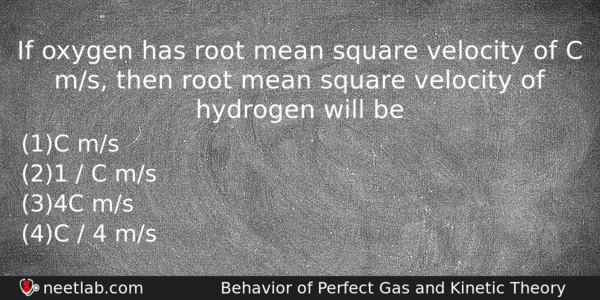| ⇦ | 
| ⇨ |
If oxygen has root mean square velocity of C m/s, then root mean square velocity of hydrogen will be
Options
(a) C m/s
(b) 1 / C m/s
(c) 4C m/s
(d) C / 4 m/s
Correct Answer:
4C m/s
Explanation:
No explanation available. Be the first to write the explanation for this question by commenting below.
Related Questions: - A metal plate weighing 750g is to be electroplated with 0.05% of its weight of silver.
- The velocity of a particle at an instant is 10 ms⁻¹ and after 5 s the velocity
- The magnifying power of a telescope is 9. When it is adjusted for parallel rays
- When one of the slits of Young’s experiment is covered with a transport sheet
- If the pressure of gas is increased from 1.01×10⁵ Pa to 1.165×10⁵ Pa and volume
Topics: Behavior of Perfect Gas and Kinetic Theory
(34)
Subject: Physics
(2479)
Important MCQs Based on Medical Entrance Examinations To Improve Your NEET Score
- A metal plate weighing 750g is to be electroplated with 0.05% of its weight of silver.
- The velocity of a particle at an instant is 10 ms⁻¹ and after 5 s the velocity
- The magnifying power of a telescope is 9. When it is adjusted for parallel rays
- When one of the slits of Young’s experiment is covered with a transport sheet
- If the pressure of gas is increased from 1.01×10⁵ Pa to 1.165×10⁵ Pa and volume
Topics: Behavior of Perfect Gas and Kinetic Theory (34)
Subject: Physics (2479)
Important MCQs Based on Medical Entrance Examinations To Improve Your NEET Score
18000+ students are using NEETLab to improve their score. What about you?
Solve Previous Year MCQs, Mock Tests, Topicwise Practice Tests, Identify Weak Topics, Formula Flash cards and much more is available in NEETLab Android App to improve your NEET score.
Share this page with your friends

root mean square velocity = √3RT/molecular weight of the gas
therefore,
Vrms is inversely proportional to root of molecular weight of the gas.
Vrms(O2)/Vrms(H2)=√Mw.weight of H2/Mw.weight of O2
root mean square velocity of oxygen is C m/s.
therefore,
root mean square velocity of H2 is 4C m/s.